When you start a new medication, you’re told what to expect: maybe a little nausea, dizziness, or fatigue. But what if the side effect is worse than expected? What if it’s something your doctor never mentioned? Too often, patients stay quiet-thinking it’s just part of the treatment, or that their doctor already knows. But here’s the truth: medication side effects only become visible to regulators and researchers when someone speaks up.
Why Your Voice Matters
Clinical trials test drugs on thousands of people. But real life? Millions take the same medicine every day. That’s where things change. A side effect that shows up in one in 10,000 patients won’t show up in a trial of 5,000. That’s why the FDA relies on reports from people like you. In 2022, over 2.2 million adverse event reports were submitted to the FDA. That’s not just data-it’s real people noticing something wrong and choosing to say something.One nurse reported unusual blood clots after a COVID-19 vaccine. That report helped identify a rare but serious condition called TTS. A patient mentioned a metallic taste after taking Paxlovid. That led to the recognition of “Paxlovid mouth.” These weren’t found in labs. They were found because someone told their doctor-or better yet, reported it directly.
What Counts as a Side Effect Worth Reporting?
You don’t need to be a doctor to know if something’s off. The FDA defines a serious adverse event as one that:- Is life-threatening
- Requires hospitalization
- Causes permanent disability
- Results in birth defects
- Needs medical intervention to prevent lasting harm
But you don’t have to wait for something “serious.” If a side effect is new, unexpected, or just really messing with your daily life-report it. Even if you’re not sure it’s the drug’s fault. The FDA says: “If you’re unsure, report it anyway.” You’re not diagnosing. You’re alerting.
Who’s Responsible for Reporting?
Technically, drug makers and hospitals must report serious side effects. But here’s the catch: they only know what you tell them. And studies show that doctors miss up to 95% of side effects patients experience. Why? Time. Overwhelm. Assumptions. A 2021 study found community pharmacists reported side effects in just 3.2% of cases. That means if you don’t speak up, it likely goes unrecorded.Patients are the most underused tool in drug safety. Only about 15% of reports to the FDA come directly from patients. That’s a huge gap. You’re not just a patient-you’re a vital data point.
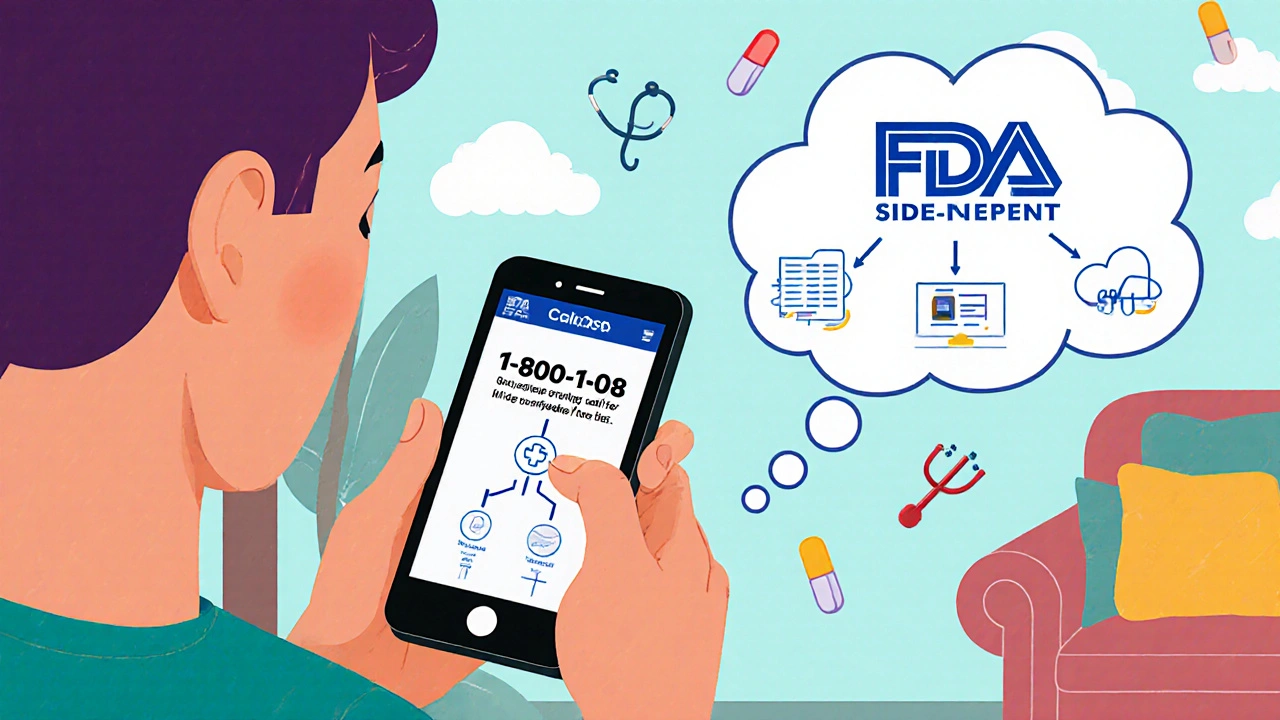
How to Report Side Effects-Step by Step
You don’t need to fill out a 20-page form. Here’s how to do it in under 15 minutes:- Call 1-800-FDA-1088. This number is now required on every prescription drug label since January 2022. It’s free, confidential, and available 24/7.
- Or go online: Visit www.fda.gov/medwatch and download Form 3500 (Consumer/Patient version).
- Have these details ready: Drug name, dose, start date, when the side effect started, what happened, how long it lasted, and whether you’ve had it before.
- Don’t worry about perfect details. You don’t need lab results or medical records. Just tell your story clearly.
If you’re reporting for someone else-like an elderly parent-you can still do it. Just note your relationship. The FDA doesn’t ask for your Social Security number or full medical history. They want your observation.
What If Your Doctor Doesn’t Take You Seriously?
It happens. You say, “I feel dizzy every time I take this pill,” and they shrug: “It’s common.” But here’s what they might not tell you: they’re not required to report every side effect you mention. They’re busy. They assume someone else will. Or they think it’s “expected.”That’s why you need to take control. Ask: “Should this be reported to the FDA?” If they say no, say: “I’d like to report it myself.” Then do it. You’re not challenging your doctor-you’re helping the system work better.
A 2023 University of Michigan study found that 58% of patients didn’t report side effects because they feared being dismissed. Don’t let that stop you. Your experience matters-even if it’s “just” fatigue, insomnia, or a strange rash.
What Happens After You Report?
Your report goes into the FDA’s MedWatch system. It’s mixed with thousands of others. Analysts look for patterns: Is this side effect showing up with the same drug across different states? Are people getting worse after a certain dose? Is it happening more than expected?It doesn’t mean your report will change the label tomorrow. But if enough people report the same issue, the FDA can issue warnings, update dosing guidelines, or even pull a drug off the market. That’s how the blood thinner Xarelto got its black box warning for spinal clots after epidurals. It started with reports from patients.
And here’s the best part: you can ask for a confirmation number. If you want to know your report was received, just say so when you call. The FDA will send you a reference number. You’re not invisible. You’re part of the system now.
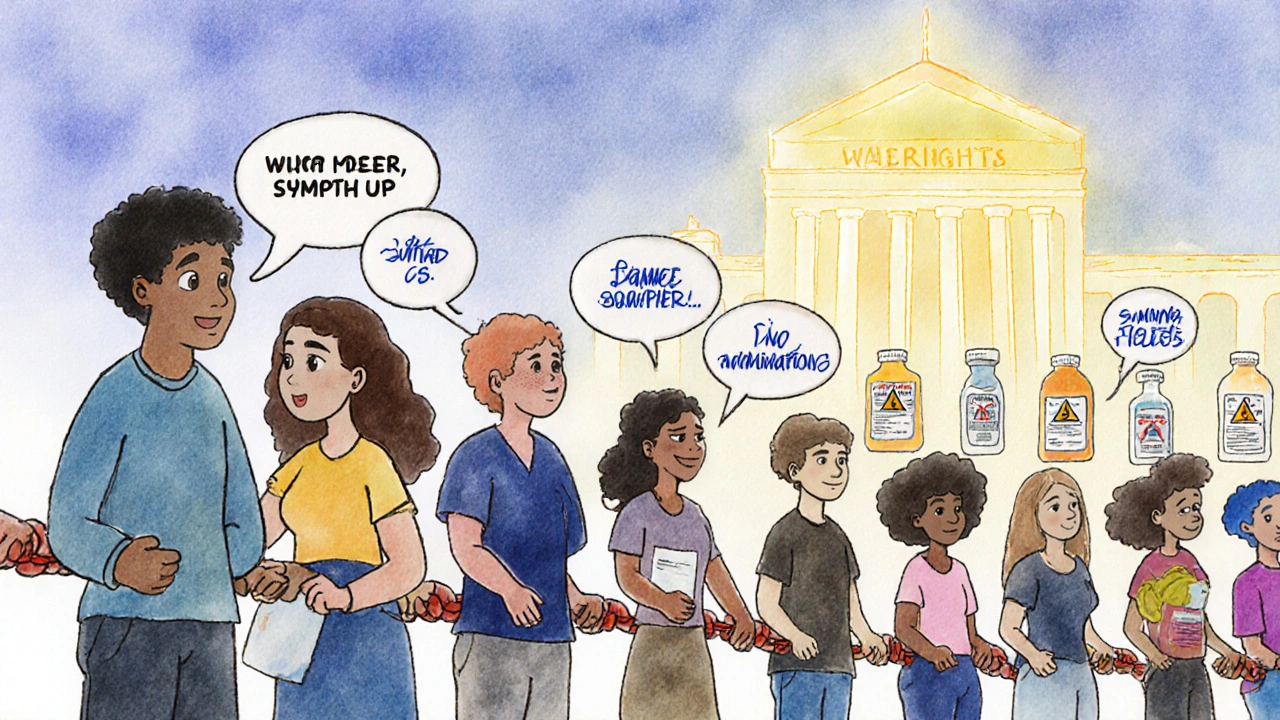
Why Most People Don’t Report-And How to Beat the Barriers
A 2022 survey found that 68% of patients didn’t know they could report side effects to the FDA. Another 42% thought their doctor handled it automatically. That’s a myth. Your doctor isn’t a government reporter. They’re a clinician. They treat you. They don’t file paperwork unless you push them to.Other common excuses:
- “It’s probably normal.” Maybe. But if it’s new, unusual, or worse than the last time you took it-report it.
- “I don’t want to be a bother.” You’re not. You’re helping future patients.
- “It’ll take too long.” It takes 10 minutes. Less than your coffee break.
And here’s the truth: if you don’t report, no one will. Not your pharmacist. Not your doctor. Not the drug company. Only you.
What’s Changing-and What’s Next
The FDA is trying to fix the system. Since 2022, drug labels must include the toll-free number. In 2023, they started testing AI tools in electronic health records to spot side effects automatically. By 2024, they’ll be pulling data from 300 million patient records to find hidden patterns.But technology can’t replace human observation. AI can’t know that your hands shake every morning after your new antidepressant. Only you can tell that. That’s why the most powerful tool in drug safety is still you-speaking up, even when it feels small.
Final Thought: Your Report Could Save a Life
You might think your side effect is too minor to matter. But in medicine, small signals become big warnings. One report might not change anything. But 100? 1,000? That’s how safety is built. Every time you speak up, you’re not just protecting yourself. You’re protecting someone’s parent, sibling, or child who will take this drug next year.So next time you feel off after a new medication-don’t wait. Don’t assume. Don’t stay quiet. Pick up the phone. Go online. Say what happened. It’s not just advice. It’s your right. And it might be the reason someone else doesn’t have to suffer the same thing.
Can I report a side effect even if I’m not sure it’s from the medication?
Yes. The FDA explicitly says you don’t need to prove causation. If you suspect a medication may be involved-even if you’re unsure-report it. Many important safety signals were found because someone reported something they weren’t certain about. The FDA’s analysts look for patterns across many reports, not individual certainty.
Do I need to give my real name when reporting?
No. You can report anonymously. But providing your contact information helps the FDA follow up if they need more details. If you’re worried about privacy, you can give a phone number or email without your full name or address. Your personal health information is protected under FDA guidelines.
Can I report side effects from over-the-counter (OTC) drugs?
Yes. The FDA accepts reports for both prescription and over-the-counter medications. Many serious reactions happen with common drugs like ibuprofen, acetaminophen, or antihistamines. If you experience an unexpected or severe reaction to an OTC product, report it through MedWatch the same way you would for a prescription drug.
How long does it take for the FDA to act on a report?
There’s no set timeline. Some reports are reviewed within days if they signal a serious or emerging risk. Others may sit in the system for months as analysts look for patterns. The FDA doesn’t respond to individual reports with updates, but if enough reports point to the same issue, they may issue a safety alert, update the drug label, or require further study. Your report contributes to that larger picture.
What if I report a side effect and nothing changes?
That doesn’t mean your report didn’t matter. Drug safety isn’t about immediate fixes-it’s about long-term surveillance. Thousands of reports are needed before a pattern emerges. Your report could be the 10th, 100th, or 1,000th that finally triggers action. Even if you don’t see results, you’ve helped build a safer system for everyone.
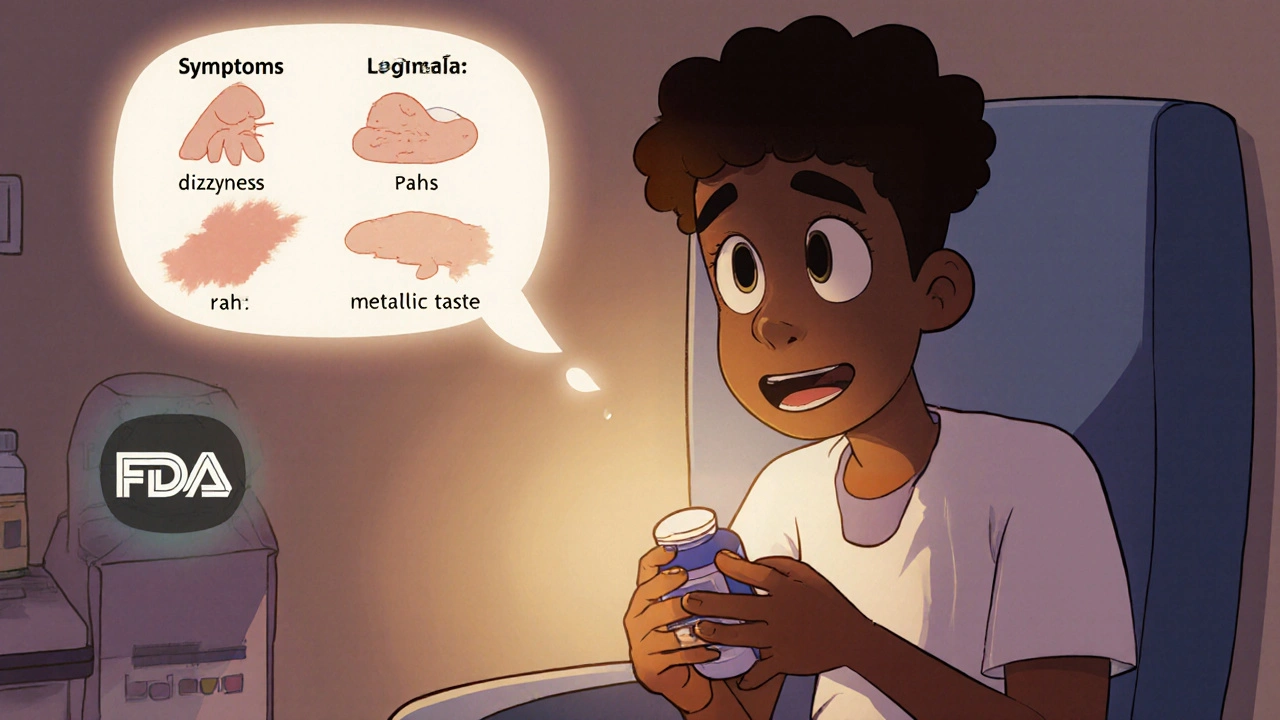

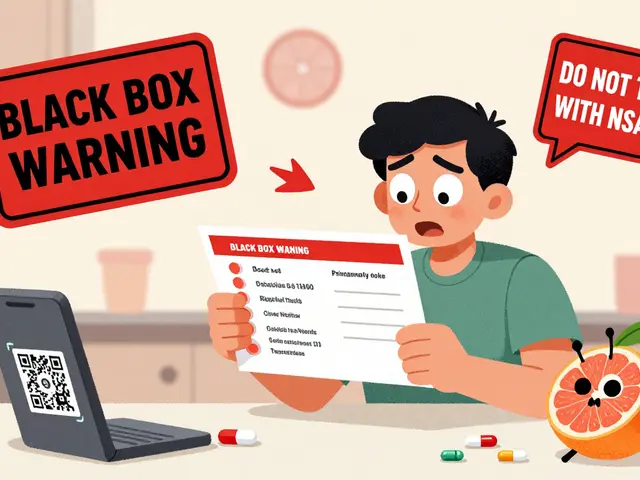
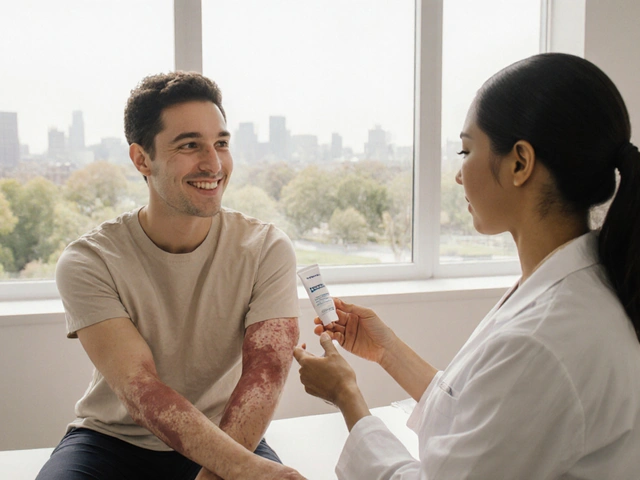

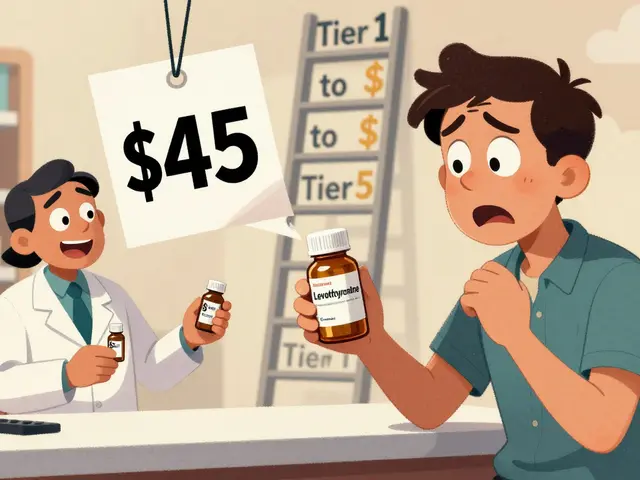
Andrew Forthmuller
November 13, 2025 AT 22:41Just reported my weird headache after the new blood pressure med. Took 8 minutes.
Nicole M
November 14, 2025 AT 04:13i had this weird metallic taste after paxlovid and just thought i was going crazy. glad to know it's a real thing now. thanks for writing this.
Charles Lewis
November 15, 2025 AT 15:47It is imperative to underscore the systemic importance of individual patient reporting in pharmacovigilance frameworks. The FDA's MedWatch program, while underutilized, represents one of the most robust, decentralized surveillance mechanisms in modern public health. Clinical trials, by their very nature, are constrained by inclusion criteria, sample size, and duration-all of which preclude the detection of rare, delayed, or idiosyncratic adverse events. It is the aggregate of patient-reported experiences-often dismissed as anecdotal-that ultimately reveals patterns invisible to controlled environments. The emergence of TTS following adenoviral vector vaccines, and the recognition of 'Paxlovid mouth,' are not fortuitous discoveries; they are the direct result of patients who refused to normalize their discomfort. This is not merely about compliance or diligence-it is about civic responsibility in the context of medical science.
Renee Ruth
November 16, 2025 AT 23:37My mom took that new antidepressant and started sleepwalking. She didn’t say anything because she ‘didn’t want to bother anyone.’ Three weeks later she fell down the stairs. Now she’s on three meds to fix the side effects of the first one. You think it’s ‘just fatigue’? It’s not. It’s a death sentence waiting to be documented.
Samantha Wade
November 17, 2025 AT 13:41This is one of the most critical public health messages of our time. The assumption that physicians automatically report adverse events is not only incorrect-it is dangerously misleading. Studies confirm that fewer than 5% of clinically significant side effects are reported by providers. The burden of documentation must shift from overwhelmed clinicians to empowered patients. The FDA’s MedWatch portal is intentionally designed for accessibility: no medical degree required, no insurance needed, no permission granted. Reporting takes less time than checking your email. And if you’re unsure whether it’s significant? Report it anyway. Your observation is data. Data saves lives. Your voice is not a nuisance-it is the cornerstone of evidence-based safety. Please, for the sake of everyone who will take this medication after you, speak up.
Elizabeth Buján
November 18, 2025 AT 21:18i just wanted to say… i felt so alone when i got that weird rash after my thyroid med. thought i was just allergic to everything. then i found out other people had it too. i reported it and got a confirmation number. i still have it. i check it sometimes. like a little badge. you’re not crazy. you’re not overreacting. you’re the reason someone else won’t have to suffer like you did. you’re doing good. seriously. i’m proud of you.
Arpita Shukla
November 20, 2025 AT 00:44Actually, most of these reports are useless. The FDA gets millions of them every year. Over 99% are noise. People report headaches after taking aspirin. That’s not a safety signal-that’s a statistical fluke. Real signals require thousands of consistent reports across demographics. You think your dizziness matters? It doesn’t. Unless you’re part of a cluster. And even then, it takes years. Don’t flatter yourself. The system doesn’t run on individual stories. It runs on big data. You’re just one drop.
Benjamin Stöffler
November 21, 2025 AT 10:02But… who is the FDA, really? A bureaucratic entity funded by the same pharmaceutical interests it’s supposed to regulate? And you’re just… trusting them? With your narrative? Your experience? Your pain? What happens when the algorithm misreads your report as ‘expected fatigue’? What happens when the AI filters out your voice because it doesn’t fit the ‘high-risk profile’? You’re not empowering yourself-you’re feeding the machine. And the machine doesn’t care. It just wants numbers. Not stories. Not souls. Just numbers.
manish kumar
November 21, 2025 AT 17:56This is so important, especially in countries where access to healthcare is limited. In India, many people take medications without proper follow-up. I’ve seen friends ignore side effects because they think doctors won’t listen or it’s too expensive to go back. But reporting to the FDA? It’s free. It’s global. And it helps not just Americans-it helps everyone. I reported my cousin’s reaction to a generic antihypertensive last year. I didn’t know it would matter. But now I know: every report is a brick in the wall of safety. Thank you for reminding us.
Mark Rutkowski
November 22, 2025 AT 14:17There’s a quiet revolution happening in medicine-and it’s not in the labs or the boardrooms. It’s in the living rooms, the hospital waiting areas, the midnight texts between friends saying, ‘Hey, did you feel that too?’ We’ve been trained to be passive recipients of care. But the truth is, healing isn’t just something done to you-it’s something you co-create. Your report isn’t a complaint. It’s a covenant. A promise that you won’t let your suffering be silent. That you’ll turn your pain into protection. And that, more than any algorithm or guideline, is what makes medicine human.
Ryan Everhart
November 23, 2025 AT 08:24So let me get this straight. You’re telling me I have to call a number on my pill bottle… to report that I feel weird after taking a drug I didn’t even ask for… because my doctor is too busy to notice? And this is the pinnacle of modern healthcare? Wow. Just… wow.
David Barry
November 25, 2025 AT 03:44Let’s be real: 90% of these reports are from people who don’t understand pharmacokinetics. They report ‘fatigue’ after a statin. But they also drink 3 coffees a day, sleep 4 hours, and take 6 supplements. Correlation ≠ causation. The FDA’s system is drowning in noise because people think their subjective feelings are scientific evidence. Don’t get me wrong-I support transparency. But we need better filters. Not more noise.
vanessa k
November 25, 2025 AT 21:58My sister’s doctor told her the nausea was ‘normal’ after her chemo drug. She didn’t report it. Six months later, she was hospitalized. Now I report every little thing. Even if it’s just a weird taste. Even if it’s just a dream. Because I learned the hard way: silence doesn’t protect you. Speaking up does.